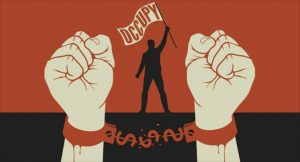Grades are a ranking system. Grades do not measure some empirical achievement; there are a relative achievement determined by a judge (with whom all judged take issue with). Grades are an imperfect measure of learning. They capture some of what one learns. They often leave out more.
Educational ideology, from the right to the left, considers assessment at some level to be a criteria referenced, neutral process. The rhetoric exhorts each and every graded one to do more. The sentiment is that with just the right combination of grit, perseverance, hard work and skill, you too can get the A.
Grades, however, do not measure excellence. They allocate resources. They divide. They are what makes this world of the student every bit as real as the world of work for pay. Grades work against cooperation; they undermine solidarity. They pit one student against the other as grades are a limited resource and one person’s gain means someone else’s loss. Immediately upon handing out a sheet of grades each honest instructor knows in their heart of heart that the honeymoon is over. We can read it in the recipients very body language.
So what’s the point of bringing it up? We all know this truth in one way or another? Grades are a definitive statement of the underlying structural relationship that guides human interactions for at least the past two hundred years wherein market mechanisms have driven valuations of individual worth and resource allocation. The point of bring up grades us that as long as one labours under the misconception that grades measure some innate ability of something that is theoretical obtainable by everyone most of us will remain unhappy; but more importantly we will remain without the capacity to really do anything about it.
Key Lessons About Grades
- Grades are not arbitrary, they are normative.
- Grades are an intrinsic aspect of capitalist society.
- Grades are an imperfect measure of learning.
What Can One Do?
- Recognize the reality of the conditions of your work.
- Work to adapt to it (without compromising principles) and to change it.
I once heard the Canadian singer and television host Tommy Hunter in an interview say “the mechanic down the street is a better musician than I am. The difference is I’m a better businessman.” Similar things could be said about getting grades. Grades don’t necessarily go to the ‘best’ student, they go to the person who is (in Hunter’s words) the best business person. It’s about figuring out what one needs to do.
Some of us have innate skills. These skills lead to nowhere without hard work and good timing. They also rely upon figuring out the optimum labour investment to output. There is a nice marxist concept, socially necessary labour time, that I suggest is relevant here. Put simply, “socially necessary labour time is the amount of labour time performed by a worker of average skill and productivity, working with tools of the average productive potential, to produce a given commodity.” That means a student who invests a maximum effort into a paper shouldn’t expect a maximum grade. It’s not how much effort one puts in, it is what kind of effort. For some taking more time might produce an average output. For other students a sub-average input might yield a superior output. The quality of the output then (as measured in grades) is not related to the time invested by a student.
It is important to recognize that there are many differnt paths that lead from one’s education. It is as though one is standing at the center of a garden with paths radiating out from in many directions. You are, in this moment, free to choose. Choice is power, but remember some paths are less forgiving than others. What is most important for you as a learner? mastery of a skill, learning something transformative, or accumulating a grade?
Through out my own life I have tended to focus on my learning, not the grade. This has consequences. Faced with an assignment I may not like, appreciate, or value, I would select something differnt, something that would give me a platform to contribute and allow me to exercise my voice. I would advise something similar to learners more intersted in learning than accumulating grades. Put a small piece of yourself into the work, but remember the work is not you, nor is it a measure of you. It is merely something you did one day.
Your task, no matter what you think or feel it is, is not todo a better paper next time. It is to learn, to develop, to explore. The paper is secondary. The mark will be forgotten But, what you take up as yours, what you take as your experience and knowledge will outlast any grade.


